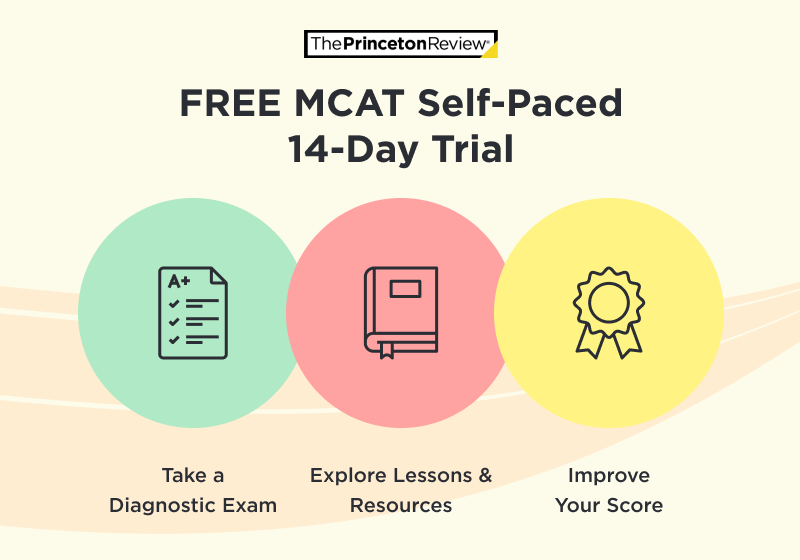There are over 140 U.S. medical schools that award the MD to graduates. These schools train students in allopathic medicine. (A smaller number of schools train students in osteopathic medicine and award the DO to graduates). Allopathic schools train tomorrow's MDs with a common (and rigorous!) core curriculum. But beyond that core, no two schools are exactly alike . Each offers its own unique academic focus, teaching methods and research opportunities.

MCAT Self-Paced
14-Day Trial
500+ hours of video lessons
17 practice tests
4,900+ practice questions
Official AAMC materials
How long is medical school?
Medical school takes 4 years to complete, but to become a doctor you'll also spend 3–7 years in residency.

The First Two Years
The first two years of medical school are a mixture of classroom and lab time. Students take classes in basic sciences, such as anatomy, biochemistry, microbiology, pathology and pharmacology. They also learn the basics of interviewing and examining a patient.
Traditionally, students take four or five courses in various disciplines at the same time. However, some schools focus on a single subject for a shorter block of time—say, three or four weeks—then move on to another. Other schools take an interdisciplinary approach to pre-clinical coursework, in which each class focuses on a single organ, examining all the anatomy, pharmacology, pathology and behavior relevant to that system. At the end of the second year, you'll take USMLE Step 1.


Read More: Guide to Your Medical School Application
The Clinical Experience: Years 3 and 4
Third and fourth year medical students do rotations at hospitals and clinics affiliated with their school, culminating with taking (and passing) USMLE Step 2. Students doing rotations assist residents in a particular specialty such as surgery, pediatrics, internal medicine or psychiatry. During this time, you'll probably feel like a cross between a mindless grunt and a skilled apprentice. You'll interact with patients and perform basic medical procedures along with any tasks the resident doesn't want to do.
While some rotations, such as Internal Medicine, are required at all programs, others have more unique clerkship requirements. The length of time you spend in a rotation depends on the hospital's focus or strength. At some schools, the surgery rotation is three weeks long; at others, it is three months. The character of the hospital will also color your experience. If the setting is urban, you can expect increased experience with trauma, emergency medicine, or infectious disease, as well as exposure to a diverse patient population.
Clinical rotations will not give you enough expertise to practice in any specialty (that's what a residency is for). They will give you a breadth of knowledge and help you consider potential career paths .
Patient Care vs. Research
You can train to be a primary care doctor at any medical school. But programs that emphasize primary care tend to include more patient contact, coursework in patient handling, and longer clinical rotations in general fields. Many are actively involved in the surrounding communities, offering volunteer opportunities in the clinical care of indigent populations.
If you're looking to pursue a career in academic medicine or biomedical research, you should look for schools with strong research programs. You will not have the same opportunities, facilities, mentors or funding at a school focused on training primary care physicians.
MCAT Self-Paced
14-Day Trial
Discover firsthand what makes us stand out.
No commitment required

Combined Degrees
If you want to complement your MD with advanced coursework in another discipline, some schools—especially those affiliated with a larger university—allow students to register for classes in other departments. Many also offer combined degree programs .
After Med School
Med students who make it through all four years (and don't worry, most do) will be the proud owner of an MD. But your education doesn't end there. You still need to pass the board exam and spend between three and seven years as a resident in a teaching hospital.
Want to get an edge over the crowd?
Our admissions experts know what it takes it get into med school. Get the customized strategy and guidance you need to help achieve your goals.
Med School Admission Counseling
Read More
Explore Graduate Programs for You
Explore our featured graduate schools & programs to find those that both match your interests and are looking for students like you.
Best Law Schools
Check out our complete list of 168 law schools, based on surveys of school administrators and over 17,000 students.
Search for Medical Schools
Visit our Med School Hub to explore med schools with our ‘Find Your Med School’ filtered search or visit our Med School Advice pages for info about good MCAT scores or interview question prep.

Find MBA Programs Matched to Your Interests
Explore our featured business schools to find those that are looking for students like you.
Explore Graduate Programs for You
Explore our featured graduate schools & programs to find those that both match your interests and are looking for students like you.
Best Law Schools
Check out our complete list of 168 law schools, based on surveys of school administrators and over 17,000 students.
Search for Medical Schools
Visit our Med School Hub to explore med schools with our ‘Find Your Med School’ filtered search or visit our Med School Advice pages for info about good MCAT scores or interview question prep.

Find MBA Programs Matched to Your Interests
Explore our featured business schools to find those that are looking for students like you.
Explore Graduate Programs for You
Explore our featured graduate schools & programs to find those that both match your interests and are looking for students like you.
Best Law Schools
Check out our complete list of 168 law schools, based on surveys of school administrators and over 17,000 students.
Search for Medical Schools
Visit our Med School Hub to explore med schools with our ‘Find Your Med School’ filtered search or visit our Med School Advice pages for info about good MCAT scores or interview question prep.

Find MBA Programs Matched to Your Interests
Explore our featured business schools to find those that are looking for students like you.



